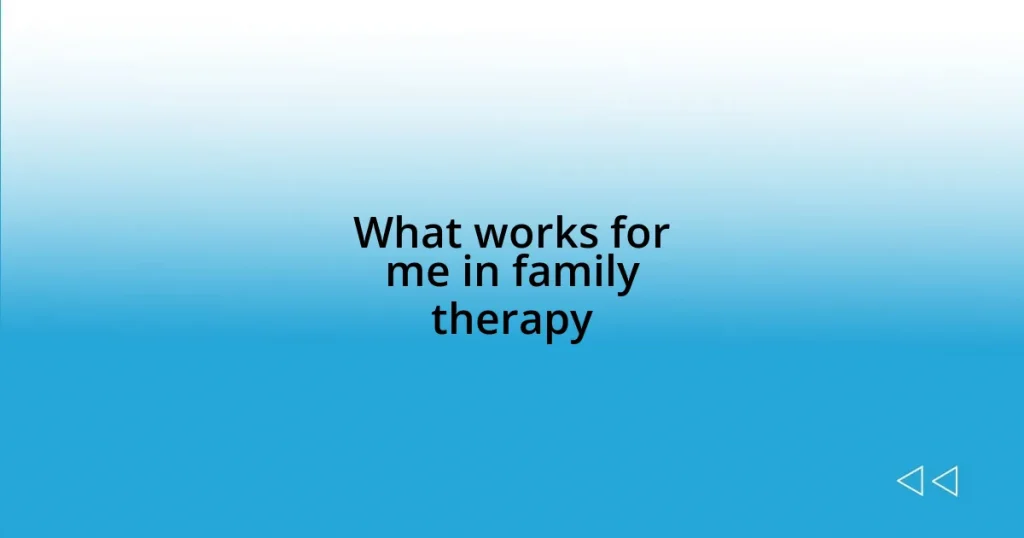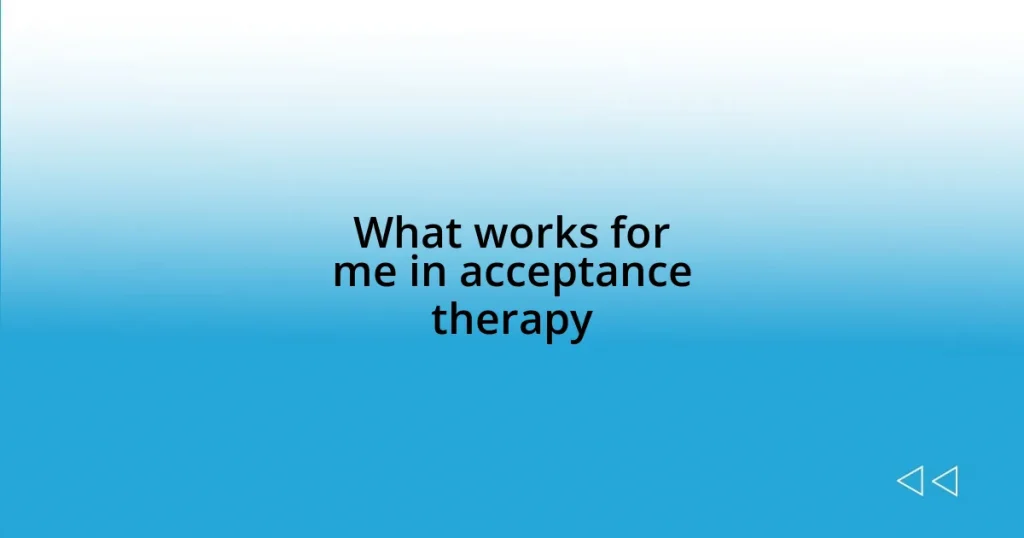Key takeaways:
- Family therapy fosters improved communication, emotional understanding, and conflict resolution skills among family members.
- Finding the right therapist involves assessing qualifications, compatibility, and cultural sensitivity to ensure a supportive environment.
- Setting clear, collaborative goals in therapy helps maintain focus and encourages ownership of the process among all family members.
- Post-therapy support can be strengthened through regular check-ins, support networks, and shared family rituals to maintain connections.
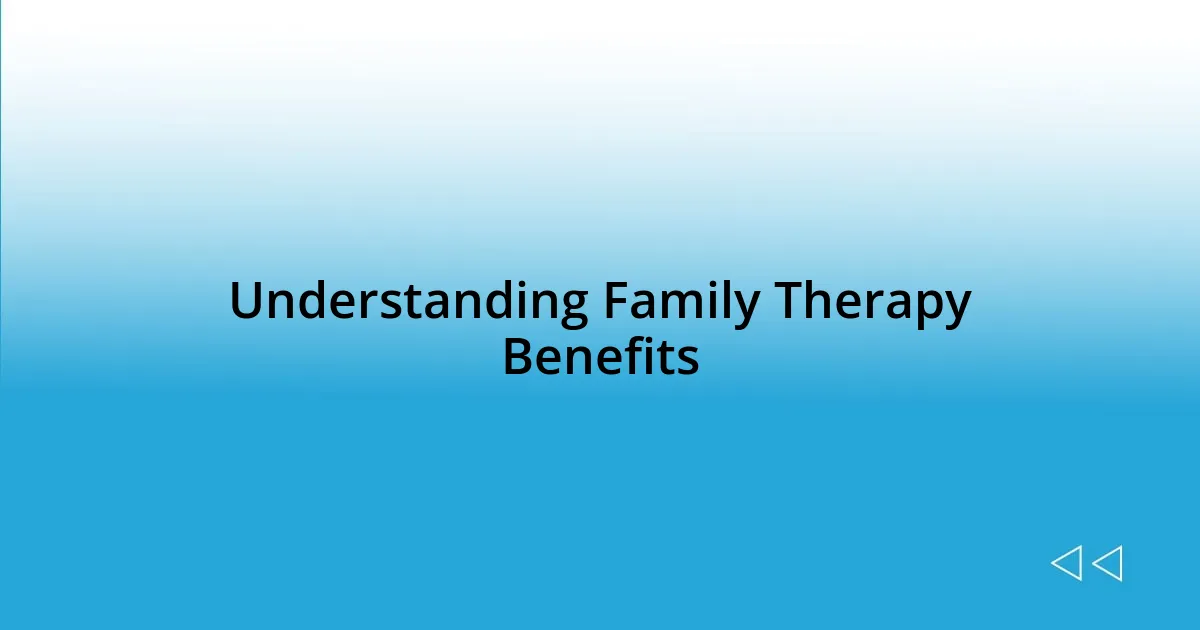
Understanding Family Therapy Benefits
Family therapy offers an incredible opportunity for families to improve communication and strengthen their bonds. I remember a time when my own family struggled to express our feelings. Engaging in therapy allowed us to explore our emotions safely, leading to deeper understanding and connections that I didn’t think were possible.
One of the most significant benefits I’ve experienced is the perspective shift that family therapy can bring. Have you ever felt caught in a cycle of misunderstandings with a loved one? I certainly have. Through therapy sessions, I learned how to see situations from others’ viewpoints, which not only reduced conflict but also fostered compassion within our family unit.
Another rewarding aspect of family therapy is the skill building that occurs. It’s not just about talking; it’s about learning effective strategies to navigate future challenges. I often think about the skills my family developed — like active listening and conflict resolution — and how they empower us to handle disagreements more constructively. It’s like having a toolkit for real-life situations that can enrich our relationships.

Finding the Right Therapist
Finding the right therapist can feel overwhelming, but it’s essential for a successful family therapy experience. I once spent weeks searching for someone who truly resonated with our family dynamic. I realized that it wasn’t just about qualifications; it was about finding someone who shared our values and could create a safe, nurturing environment.
Here are some key considerations when looking for that perfect match:
- Qualifications and Experience: Look for therapists with specific training and experience in family therapy.
- Compatibility: Schedule initial meetings to gauge if the therapist’s style aligns with your family’s needs and comfort level.
- Cultural Sensitivity: Ensure the therapist respects and understands diverse backgrounds, as this greatly influences communication styles.
- Approach to Therapy: Explore their therapeutic methods to see if they align with your family’s goals.
- Feedback Mechanism: A good therapist welcomes feedback and is willing to adapt their approach based on your family’s dynamics.
Finding someone who clicks with your family can transform the process, making it not just effective, but also enjoyable. I found that when our therapist truly understood our quirky sense of humor, it made opening up so much easier. The comfort factor can really make all the difference in these delicate conversations.

Setting Goals for Therapy
Setting clear goals for therapy is crucial to ensuring a productive experience. From my perspective, having defined objectives creates a sense of direction and purpose. I remember our first session; we laid out what we hoped to achieve, from improving communication to resolving past grievances. This clarity helped us stay focused and measure our progress.
Moreover, it’s important to involve every family member in the goal-setting process. Including everyone fosters a sense of ownership over the therapy journey. In my experience, when each voice was heard, it was like unlocking a treasure chest of insights that enriched our discussions. It’s empowering to see everyone’s aspirations become part of the collective journey.
Lastly, I believe in revisiting these goals periodically throughout the therapy. Change isn’t linear, and I found that some of our initial goals evolved as we progressed. Reflecting on our achievements helped us appreciate the growth we had made, which was motivating. Have you ever noticed how acknowledging progress can ignite a sense of hope? It certainly did for us, reinforcing a belief that we were on the right path.
| Goal | Purpose |
|---|---|
| Improve Communication | Enhance understanding and reduce conflict |
| Resolve Past Grievances | Foster healing and move forward |
| Learn Conflict Resolution Skills | Equip family members with tools for future challenges |
| Create Lasting Bonds | Strengthen the family unit and improve emotional connections |
| Regularly Reflect and Adjust Goals | Ensure the therapy remains relevant and effective |
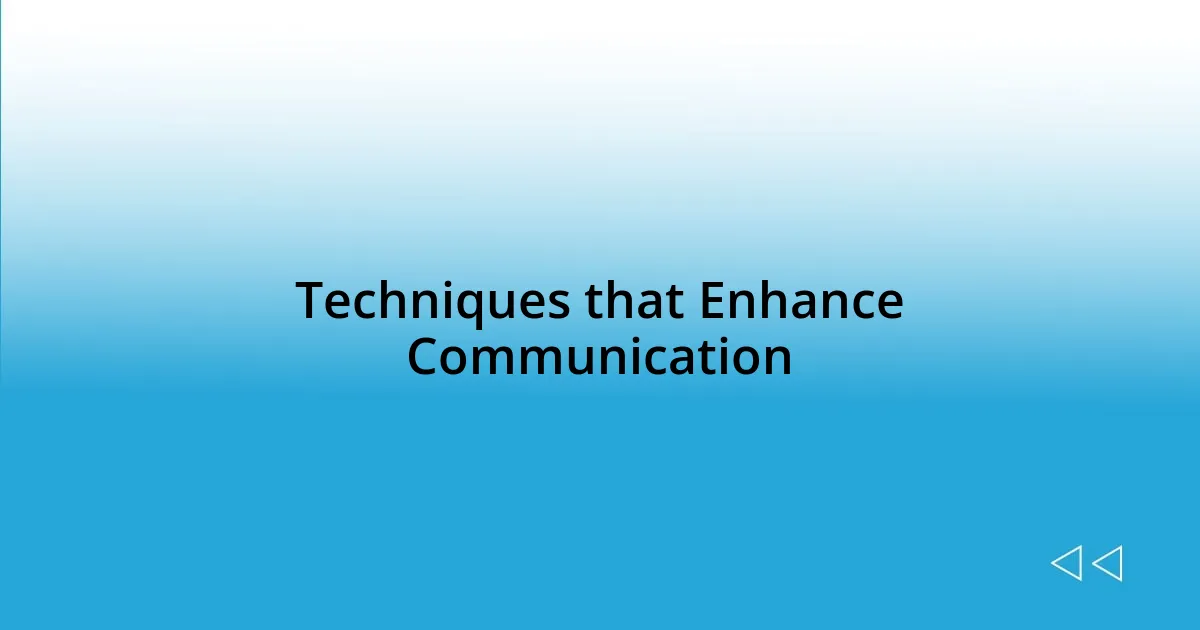
Techniques that Enhance Communication
One technique that truly enhanced our family communication was active listening. In our sessions, our therapist encouraged us to really listen to each other—not just hear the words but absorb the emotions behind them. I recall a moment when my teenager expressed frustration, and instead of jumping in with advice, I simply reflected back what I heard. It felt transformative; acknowledging their feelings deepened our bond and made them feel valued.
Another powerful approach is using “I” statements to express feelings without placing blame. I remember a discussion where my partner and I were caught in a cycle of accusations. When we shifted to saying things like, “I feel overwhelmed when there’s too much noise,” it changed the tone of our conversation entirely. This method invited empathy and understanding, easing tensions that had been simmering for too long.
Finally, humor has been a remarkable tool for us. One session, in the midst of a serious discussion, our therapist reminded us of the importance of laughter. I initiated a light-hearted joke about our chaotic family gatherings. It broke the ice, reminded us of shared joys, and allowed us to tackle heavier topics with a lighter heart. Isn’t it funny how a good laugh can create a safe space for deeper discussions? For us, it became a vital part of enhancing our communication, turning intense moments into opportunities for connection.
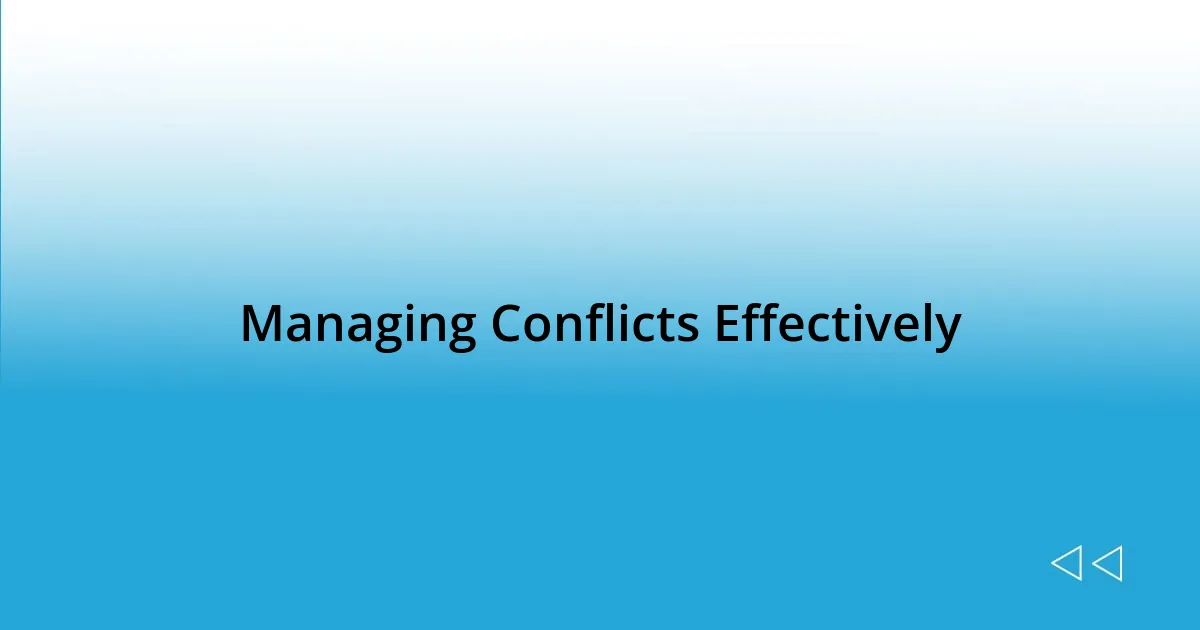
Managing Conflicts Effectively
Managing conflicts effectively requires a proactive approach and genuine willingness from all family members. One experience that stands out to me was when we faced a significant disagreement about household responsibilities. Instead of letting frustration simmer, we scheduled a family meeting. We each shared our viewpoints openly, which led us to uncover underlying feelings of being overwhelmed. Isn’t it fascinating how voicing concerns can reveal hidden layers of conflict?
I learned that establishing ground rules during these discussions can create a safe space. For instance, we agreed to let each person speak without interruption, which made a huge difference. I recall my younger sibling passionately expressing their feelings about feeling unheard. When they were allowed to air their thoughts without being cut off, I saw their distress transform into relief. This approach not only diffused the tension but also fostered understanding among us.
Another tactic that resonated with me was aiming for win-win solutions. I remember when my partner and I disagreed about our vacation plans; rather than compromising our desires, we brainstormed ways to blend our ideas. This collaborative mindset not only resolved the conflict but also strengthened our partnership. Have you ever experienced a situation where working together toward a shared goal brought you closer as a family? It’s those moments that remind me of the power of unity in resolving disputes.
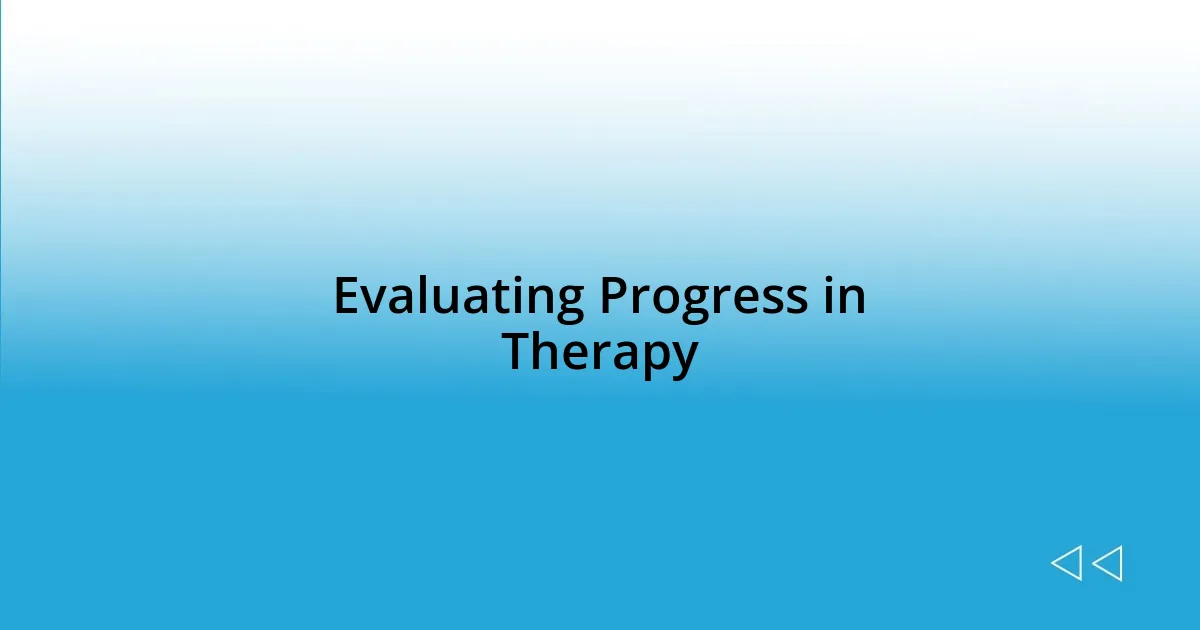
Evaluating Progress in Therapy
Evaluating progress in therapy requires honest reflection and open communication among family members. I remember during one of our sessions, our therapist introduced a simple check-in process, where each person shared how they felt about our progress. Surprisingly, my teenager admitted to feeling more connected but also expressed frustration that some issues still lingered. It was a pivotal moment; acknowledging both our successes and challenges helped us celebrate small victories while remaining committed to deeper work.
Another useful method we employed was keeping a journal of our experiences during therapy. I started writing about my feelings and thoughts between sessions, and it revealed patterns I hadn’t noticed before. For example, one week, I noticed my emotions shifted significantly after a particularly emotionally charged discussion. Reflecting on that entry in our next session allowed us to dive into what triggered those feelings. Have you ever found something unexpected in your own reflections that changed your perspective? It’s quite enlightening.
Lastly, we frequently revisited our goals as a family. I remember setting aside time during each session to look at our initial goals and examine if we were moving toward them. It created a sense of accountability and togetherness. One evening, my partner pointed out how much better we handled disagreements than before. Hearing that acknowledgment not only made me proud but also reaffirmed why we embarked on this journey together. Recognizing our progress in real-time has been instrumental in reinforcing our commitment to one another.
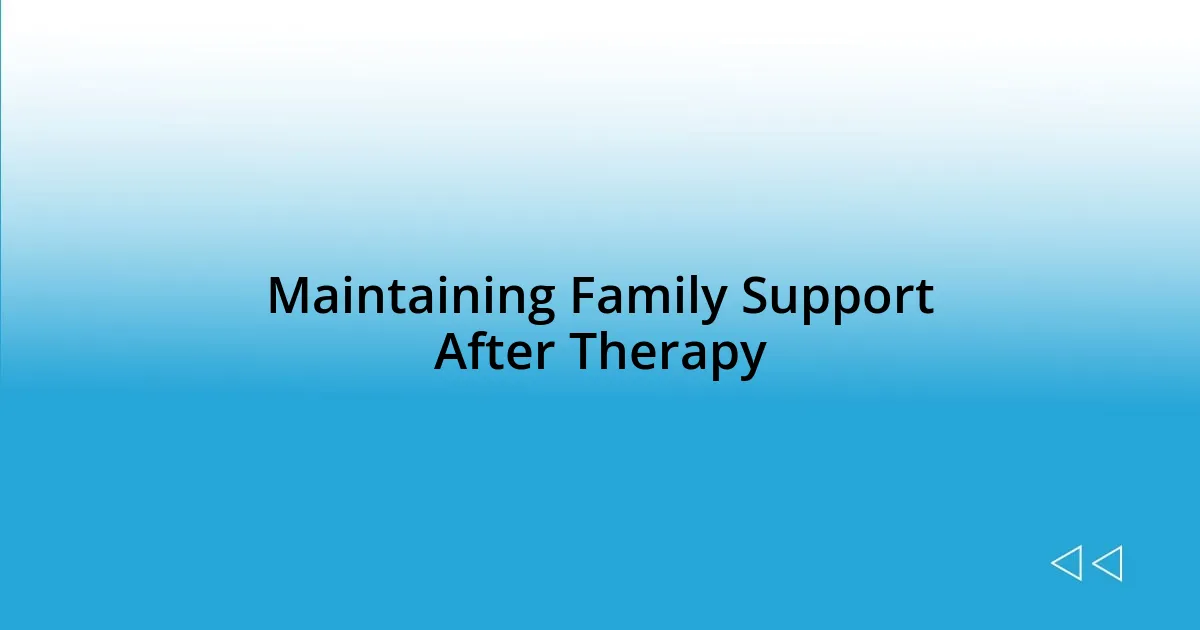
Maintaining Family Support After Therapy
Maintaining the support of family members after therapy can often feel like a delicate balancing act. I’ve found that scheduling regular family check-ins has been incredibly helpful. For instance, we dedicate Sunday evenings to gather around a cozy spot in our living room, sharing our thoughts and feelings about the week. It’s been a game-changer; these moments reinforce that everyone’s voice matters and bring us closer together. Can you think of a time when just sitting down to talk made all the difference?
Another effective strategy I’ve employed is establishing a family support network, where each member knows they can count on the others. I vividly recall an instance when my cousin went through a difficult time; we came together to lend a listening ear and offer practical help. Knowing we have each other’s backs allows for an environment where everyone feels secure and valued. Have you ever experienced a moment when the support of loved ones lifted your spirits?
Sometimes, I think about the small rituals we’ve built over time. Whether it’s enjoying a family dinner or watching a favorite movie together, these shared experiences foster connection and support. I remember how, after a tough week, a simple pizza night and laughter restored our spirits. It’s those little moments that keep us grounded and remind us of the importance of togetherness. What small traditions do you cherish with your family?











